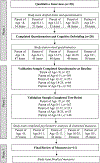Health-related quality of life in parents and partners of people with type 1 diabetes: Development and validation of type 1 diabetes and life (T1DAL) measures
- PMID: 33900103
- PMCID: PMC8376806
- DOI: 10.1037/fsh0000507
Health-related quality of life in parents and partners of people with type 1 diabetes: Development and validation of type 1 diabetes and life (T1DAL) measures
Abstract
Introduction: Despite the significant impact of type 1 diabetes (T1D) on family, few instruments are available to assess health-related quality of life (HRQOL) among family members of people with T1D. This study aimed to develop and evaluate the psychometric properties of new measures of diabetes-specific HRQOL for parents and partners of people with T1D. We report on the multistep development and validation process for the self-report Type 1 Diabetes and Life (T1DAL) measures, with versions for parents of youth age <8, 8-11, 12-17, and 18-25 years, and for partners of people age ≥18 years with T1D.
Method: First, we conducted qualitative interviews (total parents/partners n = 38) to develop draft measures and piloted them (total n = 20). Next, we tested the measures' psychometric properties. Participants (total across versions n = 813) at six T1D Exchange Clinic Network sites completed the appropriate T1DAL measure and validated measures of related constructs. We then reduced each T1DAL measure to 20-30 items in length based on psychometric data and participant feedback. Eleven participants reviewed the final measures via cognitive debriefing.
Results: The T1DAL measures for parents and partners demonstrated good internal consistency (α = .80-.88) and test-retest reliability (r = .73-.86). Correlations with measures of general quality of life, generic and diabetes-specific HRQOL, and diabetes burden demonstrated construct validity. Factor analyses identified 3-4 subscales/measure. Participants reported being satisfied with the shortened measures, which took 5-10 minutes to complete.
Discussion: The new T1DAL measures for parents and partners of people with T1D are reliable, valid, and ready for use in research and clinical settings. (PsycInfo Database Record (c) 2021 APA, all rights reserved).
Similar articles
-
Assessing Health-Related Quality of Life in Children and Adolescents with Diabetes: Development and Psychometrics of the Type 1 Diabetes and Life (T1DAL) Measures.J Pediatr Psychol. 2020 Apr 1;45(3):328-339. doi: 10.1093/jpepsy/jsz083. J Pediatr Psychol. 2020. PMID: 31665389 Free PMC article.
-
Design and psychometrics for new measures of health-related quality of life in adults with type 1 diabetes: Type 1 Diabetes and Life (T1DAL).Diabetes Res Clin Pract. 2021 Apr;174:108537. doi: 10.1016/j.diabres.2020.108537. Epub 2020 Nov 13. Diabetes Res Clin Pract. 2021. PMID: 33189791
-
Diabetes-Specific Self-Compassion: A New Measure for Parents of Youth With Type 1 Diabetes.J Pediatr Psychol. 2020 Jun 1;45(5):488-497. doi: 10.1093/jpepsy/jsaa011. J Pediatr Psychol. 2020. PMID: 32196093 Free PMC article.
-
Parental perception of health-related quality of life in children and adolescents with short stature: literature review and introduction of the parent-reported QoLISSY instrument.Pediatr Endocrinol Rev. 2013 Dec;11(2):147-60. Pediatr Endocrinol Rev. 2013. PMID: 24575550 Review.
-
Measurement of health-related quality of life for people with dementia: development of a new instrument (DEMQOL) and an evaluation of current methodology.Health Technol Assess. 2005 Mar;9(10):1-93, iii-iv. doi: 10.3310/hta9100. Health Technol Assess. 2005. PMID: 15774233 Review.
Cited by
-
Design of the type 1 diabetes and life (T1DAL) pilot and feasibility study: A brief telehealth intervention targeting health-related quality of life across clinical settings.Contemp Clin Trials Commun. 2025 May 13;45:101491. doi: 10.1016/j.conctc.2025.101491. eCollection 2025 Jun. Contemp Clin Trials Commun. 2025. PMID: 40491663 Free PMC article.
-
Applying the use of shared medical appointments (SMAs) to improve continuous glucose monitor (CGM) use, glycemic control, and quality of life in marginalized youth with type 1 diabetes: Study protocol for a pilot prospective cohort study.Contemp Clin Trials Commun. 2023 Jan 16;32:101067. doi: 10.1016/j.conctc.2023.101067. eCollection 2023 Apr. Contemp Clin Trials Commun. 2023. PMID: 36698741 Free PMC article.
-
Evaluating a Digitally Delivered, Multi-Modal Intervention for Parents of Children with Type 1 Diabetes: A Proof-of-Concept Study.Children (Basel). 2024 Sep 12;11(9):1114. doi: 10.3390/children11091114. Children (Basel). 2024. PMID: 39334646 Free PMC article.
-
Differences in positive expectancy of hybrid closed loop (HCL) insulin delivery systems do not explain racial differences in HCL use.J Clin Transl Endocrinol. 2023 May 20;32:100319. doi: 10.1016/j.jcte.2023.100319. eCollection 2023 Jun. J Clin Transl Endocrinol. 2023. PMID: 37273975 Free PMC article.
-
Parent Quality of Life scale in Type 1 Diabetes: a scale development and validation study.Eur J Pediatr. 2023 Aug;182(8):3491-3499. doi: 10.1007/s00431-023-05023-y. Epub 2023 May 15. Eur J Pediatr. 2023. PMID: 37184648
References
-
- Agiostratidou G, Anhalt H, Ball D, Blonde L, Gourgari E, Harriman KN, …Weinzimer SA (2017). Standardizing clinically meaningful outcome measures beyond HbA1c for type 1 diabetes: A consensus report of the American Association of Clinical Endocrinologists, the American Association of Diabetes Educators, the American Diabetes Association, the Endocrine Society, JDRF International, The Leona M. and Harry B. Helmsley Charitable Trust, the Pediatric Endocrine Society, and the T1D Exchange. Diabetes Care, 40, 1622–1630. doi: 10.2337/dc08-0394 - DOI - PMC - PubMed
-
- Braun V, & Clarke V (2008). Using thematic analysis in psychology. Qualitative Research in Psychology, 3, 77–101. doi: 10.1191/1478088706qp063oa - DOI
-
- Cappelleri JC, Gerber RA, Quattrin T, Deutschmann R, Luo X, Arbuckle R, & Abetz L (2008). Development and validation of the Well-being and Satisfaction of Caregivers of Children with Diabetes Questionnaire (WE-CARE). Health and Quality of Life Outcomes, 6, 3–11. doi:10.1186/1477-7525-6-3 - DOI - PMC - PubMed


